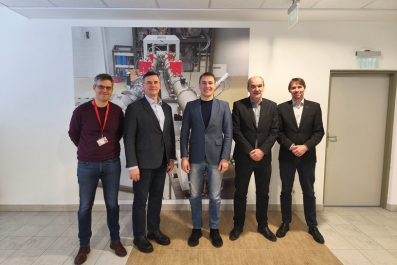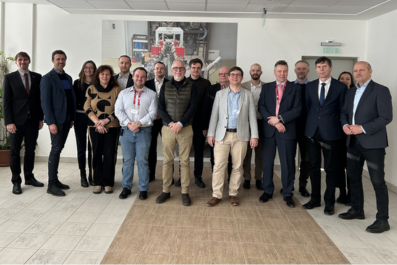STUDY PROGRAMME features and objective
Attained knowledge base
- A graduate of the interdisciplinary study programme, composed of cybernetics and computer science, demonstrates his or her general knowledge of both intersecting fields gained throughout the course of their studies.
- He or she acquires applicable expertise within the disciplines of information technologies (programming languages and integrated development environments, simulation systems, statistical tools).
- He or she is capable of data acquisition for analysis and synthesis.
- A graduate understands the principles of information storage and distribution, including all the security aspects.
- They are acquainted with systems theory, system modelling, and simulation.
- He or she comprehends process automation.
- A graduate gains knowledge regarding theory of control systems.
- He or she knows how to evaluate static, transfer and frequency characteristics of dynamic processes.
- Identifies a system as stable in accordance with its output.
- Has the ability to develop and optimise continuous and discrete controllers.
- Can instruct a programmable logic controller to perform desired set of operations.
- Understands the principles of physical properties of materials and their quantification by means of measurement.
- Has a well-defined perception of mathematics, physics, mechanics, electrotechnical engineering and their principles.
- Recognises and is up to speed with the latest details and figures about manufacturing technologies and information systems.
Key learning outcomes
- Employing his or her accumulated intellectual resources, a graduate can design and program information and automation systems, exercising his or her erudition regarding algorithms and methods of software engineering.
- Is familiar with operating systems Windows and Linux and executes tasks within both these environments.
- Can make various documentations, overviews, and statistics, based on the provided facts.
- Is introduced into and, consequently, made familiar with MATLAB and its components.
- Is capable of tuning regulators for PLCs.
- Has the ability of independent theory, procedure and tool application while building systems of automated control used to command technological and manufacturing processes.
- Can assess the worth of solutions based on information and communication technologies as well as design, implementation, management, and the utilization of manufacturing and automated control systems.
General competencies
- Acts in a self-reliant manner when solving assigned tasks.
- Chooses and then takes the most efficient course of action when getting to the root of a problem.
- A graduate exhibits the appropriacy to estimate the impact of technologies on society and the environment.
- He or she possesses the ability to improve all qualifications gained up to a given point in time and educate oneself to a greater extent individually as well as in organised learning groups and courses.
- Applies his or her education as regards management, economics, law, ecology, and ethic while carrying out their occupational duties.
- Presents himself or herself with a pioneering mindset and ideas.
- Competently collaborates in a group setting and, putting team management theories into practice, leads teams.
- Eloquently presents his or her projects and provides further elucidation.
- Showcases his or her linguistic relevance in relation to his or her line of employment.
labour market demand and CAREER PROSPECTs
Professional paths and occupational outlook
- According to https://uplatnenie.sk/?degree=V%C5%A0&vs=702000000&faculty=702060000&field=2621R19&year=2019, 5% of graduates of the study programme of Applied Informatics and Automation in Industry in 2019 continue their studies in a follow-up study programme of the second degree, 5% is successfully employed within the field.
- As an employee, he or she is adept at finding and ensuring innovative approaches to solutions, implementation, and maintenance of information technology systems. He or she can perform analysis of system and automation requirements and put automation and information technologies into operation for control systems either alone or as a part of a structured team. He or she proficiently applies his or her managerial, economic, legal, environmental, and ethical consciousness within his or her workplace.
- A graduate is apt for pursuing a related degree of a higher level of education (Process Automation and Informatization in Industry at MTF STU or other compatible universities).
- A graduate is ready to work in the public service, industrial, and other economic sectors.
- On the report of The Ministry of Labour, Social Affairs and Family of the Slovak Republic project, sustavapovolani.sk, a person who has successfully completed the aforementioned course of study can seek positions of employment as a: computer operator, computer engineer, computer network technician, ICT project manager, web designer, systems analyst, database administrator, database analyst, application developer, application programmer, data architect, data analyst, data scientist, machine learning engineer, CIO, ICT management and support technician, software developer, software solution designer, ICT support and test engineer, multimedia designer, business intelligence analyst, quality assurance analyst, process manager, PLC programmer, automation engineer.
Educational consultant: doc. RNDr. Mária Mišútová, PhD., maria.misutova@stuba.sk
Academic supervisor responsible for cybernetics: prof. Ing. Pavel Važan, PhD. pavel.vazan@stuba.sk
Academic supervisor responsible for informatics: Dr.h.c. prof. Dr. Ing. Oliver Moravčík, oliver.moravcik@stuba.sk


